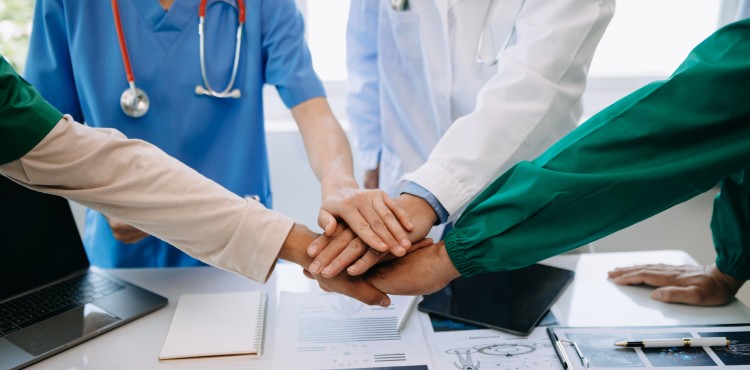
Interdisciplinary teamwork reduces complications in bone fractures
An injury in a car accident, a twisted ankle while out jogging, a fall at home: bone fractures can occur very quickly. But not all fractures are the same. Also, complications can arise such as a malpositioning or postoperative infections. In order to provide the best possible care for patients in such cases, interdisciplinary consultation in diagnostics and therapy is essential. This is where the EXPERT project comes in, which was started by the Medical Faculty of the University of Münster in June 2022. A number of university physicians headed by project leader Dr. Steffen Roßlenbroich are planning to build up a digital experts’ forum for the treatment of fractures with so-called soft-tissue damage and postoperative complications, enabling interdisciplinary consultations to be held also in non-university hospitals.
“We have been engaging in interdisciplinary work for a very long time now. It’s especially of benefit in the case of older patients,” says Prof. Michael J. Raschke, Director of the Clinic for Trauma, Hand and Reconstructive Surgery at Münster University Hospital (UKM) and initiator of the EXPERT project team. “We want to use the platform to make our expertise available.” The idea, he adds, is to thus minimise risks, as well as to enable decisions to be made faster and modern forms of treatment to be established. “We prescribe individual therapies in order to ensure the best possible treatment for patients,” Raschke explains. As Prof. Tobias Hirsch, Head of the Plastic Surgery Section at the Clinic for Trauma, Hand and Reconstructive Surgery at UKM and Senior Consultant at the Plastic Surgery Department at Hornheide Specialist Clinic, adds: “An important aim we have is to spread university expertise wide. Not every hospital on the periphery can cover every specialist field. There are no digital structures for patients with complicated bone fractures or other complications. So far, the specialists all had to be asked individually.” A laborious and time-consuming procedure, he says.
This is why 33 hospitals in North Rhine-Westphalia, Lower Saxony and Bremen, offering varying levels of care, are involved in the project. Taking around 2,700 patients as its basis, the study is examining whether aspects such as the length of treatment, the provision of health services and the costs of in-patient care can be optimised: the aim is for telemedical access to the interdisciplinary experts’ forum to not only enable the fastest possible treatment to be provided, but also to avoid unnecessary double examinations. The objective is to reduce the complication rate in the treatment of complicated open fractures and to avoid renewed operations. Experts involved in the project come from a range of disciplines: trauma surgery, plastic surgery, vascular surgery, angiology, microbiology, radiology, hygiene, infectiology and pharmacy. The team also includes Dr. Dagmar Horn, who is not only a member of the Antibiotic Stewardship (ABS) team at UKM but is also responsible for medication management there. “We have a lot of experience in drug treatment customised for individual patients,” she says, “with a focus in particular on treating infections. Something which is important to us, for example, is to reduce any unnecessary use of antibiotics and the associated occurrence of resistances.”
The university physicians are expected to start making initial recommendations for participating hospitals in the autumn. “Our long-term aim is to transfer online exchanges between experts from various disciplines to everyday work,” says Steffen Roßlenbroich, who not only heads the EXPERT project but is also managing senior physician at the UKM Clinic for Trauma, Hand and Reconstructive Surgery. Establishing the forum on a permanent basis aims ultimately to relieve the pressure on the health system.
The EXPERT project
“EXPERT” stands for “Extremity boards for the process optimisation, evaluation, risk minimisation and treatment optimisation in fractures with soft-tissue damage or postoperative infection in the lower extremities in the trauma network”. The three-year project is receiving 6.9 million euros of funding from the Gemeinsamer Bundesausschuss (Federal Joint Public Health Committee). Cooperation partners include the AOK NordWest and BARMER medical insurance funds, the Hornheide Specialist Clinic, the OFFIS Institute of Informatics, Steinbeis University, the Techniker medical insurance fund and the University of Bielefeld.
